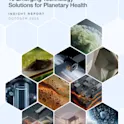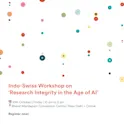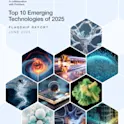
Frontiers updates
23 Jan 2026
Frontiers Science House: did you miss it? Fresh stories from Davos – end of week wrap
Read more about the individual stories from the Frontiers Science House.

Frontiers updates
23 Jan 2026
Read more about the individual stories from the Frontiers Science House.

Frontiers news
22 Jan 2026
Frontiers Science House Day 2–3 programs spotlighted urgent global risks and practical, science-led solutions – from antimicrobial resistance (AMR) and trust in science to AI-enabled sustainable cities and cancer research in microgravity.

Frontiers news
21 Jan 2026
Genisys AI today announced the launch of AI Polis, a pioneering AI-powered platform that helps cities plan and scale sustainable, people-centered growth. The announcement was made during a session at the Frontiers Science House, taking place on the Davos Promenade alongside the World Economic Forum Annual Meeting 2026.

Robotics and AI
16 Dec 2025
AI hardware needs to become more brain-like to meet the growing energy demands of real-world applications, according to researchers.

Frontiers news
15 Dec 2025
A new whitepaper from Frontiers shows that AI has rapidly become part of everyday peer review, with 53% of reviewers now using AI tools. The findings in Unlocking AI’s untapped potential: responsible innovation in research and publishing point to a pivotal moment for research publishing. Adoption is accelerating and the opportunity now is to translate this momentum into stronger, more transparent, and more equitable research practices as demonstrated in Frontiers’ policy outlines.

Health
30 Oct 2025
As AI—and the ethical debate surrounding it—accelerates, scientists argue that understanding consciousness is now more urgent than ever.

Frontiers news
15 Oct 2025
The World Economic Forum and leading open science publisher Frontiers today launched the inaugural 10 Emerging Technology Solutions for Planetary Health report, a landmark publication spotlighting ten breakthrough innovations that could accelerate global efforts to tackle climate change, restore ecosystems, and build long-term resilience. These technologies offer scalable, science-based solutions to help society operate within planetary boundaries and foster a more sustainable relationship with Earth's systems.

Frontiers news
13 Oct 2025
Frontiers, the open-science publisher, is tackling this problem with the launch of Frontiers FAIR² Data Management, the world’s first all-in-one, AI-powered service for research data. Designed to transform how data is shared so it is reusable and credited, it brings together curation, compliance checks, AI-ready packaging, peer review, an interactive portal, certification, and lifetime hosting in a single workflow — ensuring that research funded today delivers faster breakthroughs in health, sustainability, and technology tomorrow.

Frontiers news
08 Oct 2025
Frontiers, one of the world’s leading open-access publishers, brings its global expertise in research integrity and responsible AI to the Indo-Swiss Workshop on Research Integrity in the Age of AI, held on 10 October 2025 at the Bharat Mandapam Convention Centre, New Delhi. Organized by Frontiers in partnership with the Indian National Young Academy of Sciences (INYAS) and Swissnex in India, the event convenes policymakers, scientists, and publishers from India and Switzerland to explore how artificial intelligence can be used responsibly in research and strengthen trust in science.

Open science and peer review
16 Sep 2025
Frontiers has long been a pioneer in using AI to support academic publishing at scale. As we celebrate Peer Review Week 2025 – the theme of which is ‘Rethinking Peer Review in the AI Era’ – we’re also celebrating our very own AI assistant and digital teammate, AIRA.

Frontiers news
15 Sep 2025
“Fast-churn” science—manuscripts built from quick queries of public datasets—has become an industry-wide concern. These rapidly executed studies can flood journals with low-quality, redundant findings. The preprint Dramatic increase in redundant publications in the Generative AI era highlights the scale of the problem.

Frontiers news
24 Jun 2025
Cutting-edge technologies addressing climate, healthcare, and digital authenticity are spotlighted in the report co-published by the World Economic Forum and Frontiers. Pooling the expertise of hundreds of leading scientists from around the world, the report identifies early-stage technologies with the potential to become fully developed and adopted within the next five years.

Robotics and AI
19 Jun 2025
Researchers found some LLMs create four times the amount of CO2 emissions than other models with comparable accuracy. Their findings allow users to make informed decisions about their own LLM use.

Featured news
03 Mar 2025
On Open Data Day 2025, Frontiers is launching the FAIR² (FAIR Squared™) Data Management Pilot, a first-of-its-kind peer-reviewed service that helps researchers get credited and cited for their work while making data AI-ready, reusable, and impactful. FAIR² Data Management leverages AI-assisted curation to structure research data for publication, making it easier to find, reuse, and analyze—both by humans and machines—so researchers can focus on discovery rather than data preparation. By making datasets shareable and optimized for reuse, FAIR² Data Management enhances research efficiency and reproducibility, accelerating breakthroughs in global health, planetary sustainability, and scientific innovation.

Frontiers news
25 Jun 2024
The World Economic Forum, in association with Frontiers, new Top 10 Emerging Technologies of 2024, released today (25 June), shows that among technologies emerging globally, reconfigurable intelligent surfaces and High-Altitude Platform Systems have the potential to connect billions worldwide who currently have no internet access.
Get the latest research updates, subscribe to our newsletter